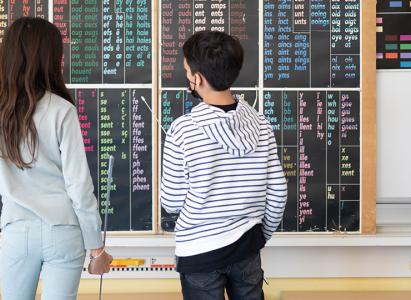In my last blog I wrote about the incredible experience I recently had visiting the Federal University of Pará in Belém, Brazil. As I prepared for my trip I felt excited about the opportunity to share my reflections with colleagues in Belém and I spent a good bit of time working on my presentation “ Pedagogical innovation: education for global citizenship.” Whilst there were many rich exchanges about transdisciplinarity and global citizenship during my stay, what I really want to write about here is language.
Unfortunately, I don’t speak Portuguese so the university arranged for some undergraduate students and later an EAL Professor, to translate for me when I gave my presentation and during the round table discussions. I was touched by the students’ eagerness to help me but simultaneous translation is not easy and it was a bit of a struggle for all of us. During the sessions and throughout the visit, I was very conscious of the ways in which I was drawing from my own linguistic repertoire in order to understand and to participate. I looked for written and oral cues in Portuguese that I could connect to the Romance languages I do know, French and Italian. I was aware of body language and what that could tell me. I suppose I would say that my metalinguistic awareness was at a peak.
There were times when I felt discouraged as, for example, the moment when I realised that I would need to modify the content of my talk in order to respond to the needs of my translators and the audience. There were equally moments of excitement when there was satisfying communication between us and an authentic exchange of ideas. At the end of each day I can honestly say that I was both exhilarated and exhausted.
At one point the professor who was assigned as translator asked me if I was frustrated, as he had read my paper and knew all that I had hoped to say. Certainly, there was a degree of disappointment but I am also grateful to have been reminded of what so many of our multilingual students experience every single day.
In our language policy, as is the case with many schools, there is a statement about how all teachers are language teachers. Truly living that aim means that classroom practitioners are not only teaching the language of their discipline but also engaging in multilingual practices (code-meshing, transidiomatic practices, heteroglossia, translanguaging) that facilitate access to the curriculum for students whose first language is not the same as the language of instruction. It also means taking language into account when we speak about inclusion and supporting teachers in developing “the pedagogical competences needed to manage linguistic and cultural diversity.”
There are more than 300 languages in Amazonia, many of them endangered, and one of the subjects of discussion in Belém was the integration of indigenous students into academic life at university. What an extraordinary opportunity they have to promote multilingual practices, to challenge existing hierarchies of knowledge, and to experiment creatively with modes of assessment.
If you are interested in developing multilingual pedagogies which are inclusive, transformative, empowering for students and which may ultimately contribute to greater social justice, I invite you to register for The Multilingual Learner: Theory to Practice. This online module taught by Eowyn Crisfield and Jo Skelton provides an opportunity for non-language specialists to hone their skills in teaching multilingual learners through investigation of theory, research, and practice and is open to both primary and secondary teachers.
